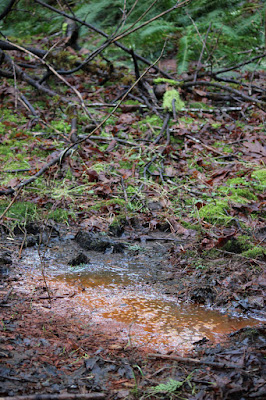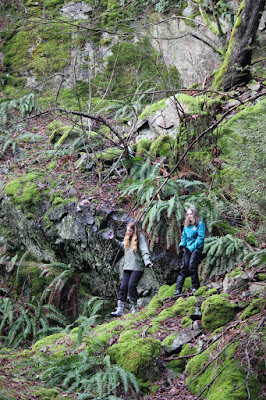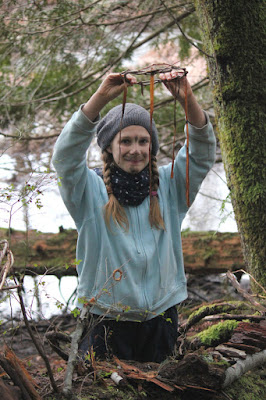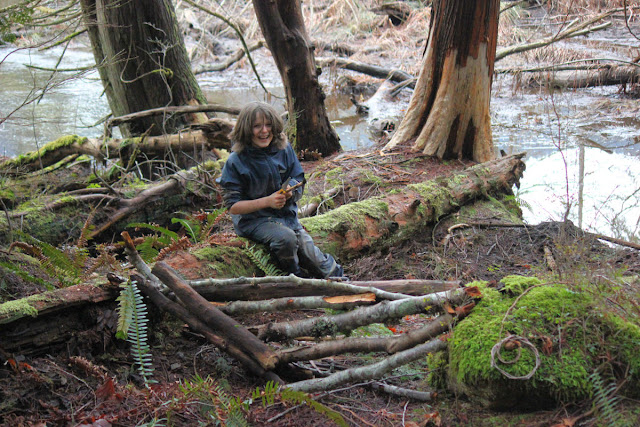Has your kid ever looked at you in earnest, and accused you of causing them problems by unschooling them? Mine has. And it was in that moment that all the indignation and arrogance I'd built our unschooling life upon totally collapsed. Because indignation and arrogance might have given us the courage to jump out of a system that wasn't working, but in the end they were just walls we built around our hearts to keep us from the vulnerability of life. Some of us unschoolers needed those walls to protect us as we built this new world, but now it's time for the walls to come down. I have made lots of mistakes. Now I want to own up to them, and grow.
Mistake #1: Succumbing to Self-Doubt
Actually, my reaction in that moment, a few years ago, when my son told me I had set him up for failure by unschooling him, was to question everything I've done as a parent and to cave in. It's a great thing to question ourselves, to evaluate, assess, and make changes, but there has to be an end to it. At some point very soon in the questioning we need to adjust course (or not) and keep on steering the ship. Instead, in that moment, I told myself I'd failed. I told myself I'd destroyed my son's life. He calls me dramatic and he's right! I mean, there's place for drama in the world--I'm an artist and writer, and I know that drama is often the key to reaching people. But when the people is your kid, and the reaching needs to be done with a supportive and steady hand on the wheel of his life, drama is not the way to go. Yeah. I bombed that. I basically let go of the ship's wheel and hid in a corner for a few weeks.
Unschooling being what it is, he already had the freedom to steer his own ship, and he really did quite well, getting into a groove that worked well for him, and forgetting all about that day he had blamed unschooling for whatever the frustration was, at the time (we have both forgotten, by now). But unschooling is really largely about leading by example, and in that time I unfortunately set an example of succumbing to self-doubt--something that my son already struggles with, and which I desperately wish I hadn't modeled so well.
Another way that we often succumb to self-doubt is defensiveness. Other parents or family members question our unschooling choices (or lack thereof) and out of fear, self-doubt, or frustration, we get defensive. A little explanation can go a long way in educating others, and that's definitely a good thing, especially when making social precedent for others to join our journey. But when we get wrapped up in trying to defend the place we are in the journey, it's hard to keep moving--to carry on the actual journey. We can get stuck in that defensive place, and that's not the great big adventure unschooling was supposed to be!
Live and Learn, as they say. The learning is easy, because, as unschoolers know (or are trying to remind ourselves, constantly), learning just happens. It's the living--or sailing, to return to my previous analogy--through all the rough seas and mistakes and course-adjustments that happen along the way that can be challenging. But we're up for a challenge, right?
Mistake #2: Protecting our Kids from Challenges
It seems obvious, when you look at a title like that. We know our kids need to face and overcome challenges in order to learn and gain confidence. But watching them trip and fall and not rushing to catch them before they hit the ground is another matter. Or not clearing their pathway right from the start to avoid them even tripping in the first place. I've done that. OK, I still do it!
I'm so guilty of this that after all nineteen years I still catch myself doing it almost every day. I'm OK with the big things: hearing my kid's plan to attend a school program that I don't really like, and buckling in for the ride, for example. But in the moment, I have very little control over my own mouth, and find myself constantly forecasting problems that I think my kids should avoid, or advising them on ways to keep safe, or be successful in their endeavour, etc. My son made himself a great keyboard tray this morning, and was struggling to fit it into his desk. I just had to advise him on what I felt was a "better" way to design it. Gak. What does this constant advice do to my kids' confidence?! I know very well what it does. It kills it. I walked into the problem he was well on his way to solving himself, and reminded him that somebody else knows better. What the hell?! I only know better because his father and I made a keyboard tray for that same desk, ourselves... and figured out the challenges, ourselves! And we did this at a time when we were gleefully living away from our parents, free to make our own mistakes, and learn from them.
Seriously. Like I mentioned before, living and learning sometimes seems to take a lifetime. I wish I had held my mouth shut this morning. He probably would have made a great keyboard tray that might have been very different from my design, and possibly even better suited to his needs.
Confidence-shattering is not the only harm caused by protecting our kids from challenges. Having a life devoid of struggle, strife, and challenge, or--alternatively--a life in which somebody else was always ready to solve their challenges, leaves kids unprepared to meet the challenges they will inevitably face, in life. It leaves them looking for solutions from other people instead of exploring and trusting their own ingenuity. It leaves them less resilient.
Now, as an unschooling parent, I've been told many times that my kids need to face the bullying and hardship of school so they can "toughen up", but that's not what I'm talking about. Toughening up isn't becoming resilient; it's building a hard shell, and that doesn't seem very healthy to me! I know. I've had a hard shell all my life. I don't want that for my kids. I want them to feel so confident, so resilient; so intrinsically strong and ingenious, that they can be vulnerable and live their lives without fear. That is resilience.
Although I'm still struggling to allow my kids to fall, I'm all good on being there to commiserate or snuggle them when they're picking themselves back up again. Unschooling gives us the chance to really live with our kids, and if we can master allowing them to meet their own challenges, we're in the wonderful position of being their support team.
Mistake #3: Comparing
The whole school system works on comparison. No matter how hard our amazing teachers try to nurture the unique skills and needs of every child, they work in a system that requires them to evaluate our kids. This kind of evaluation requires some kind of a measuring stick, and by nature that means comparison. The root of our whole school system is therefore competitive, and that's exactly why many of us chose to unschool. But then we got our kids at home and panicked that they weren't "keeping up", or that they'd struggle should they ever need to join the system.
Remember, most of us were raised in the system. We're terrified of failing, of allowing our kids to fail. Those fears are deeply ingrained and didn't just get left behind when we stuck the word "unschooling" on ourselves. They are firmly rooted in our every word and action. In fact, some people even choose to unschool because of the reported competitive advantages it gives kids in adulthood. But then we forgot that the competition was so dangerous.
To me, the biggest benefit of unschooling is the fact that we can separate ourselves from that kind of competition and live by our own intrinsic values. It gives us the opportunity to make our choices based on our own moral and intellectual standards--and by "us" I mean parents and kids separately. Unschooling means that kids are defining their own goal-posts, their own compasses; their own personal evaluation criteria. Every time we judge them, or even worse, compare their achievements to others or to some kind of outside expectation, we take back that power from them, along with their impetus to lead themselves.
Sometimes we're comparing our kids, even without words. I can't tell you how many kids I've taught art to who walked into my program with the idea that they couldn't draw, or that they only knew how to draw one specific thing (usually a cartoon character). You know how they became that way? From guided art projects, where either the book they learned from or the adult they were with set up an expectation for them to follow. Maybe they succeeded and their work was comparable, but more likely, since the book or example-drawing was made by an adult with much more experience, they saw all the dissimilarities between their own work and the example, and they felt defeated. Luckily, teaching art was something I did for a long time before I had kids, so I managed to stop myself from creating situations where my kids would compare their art to mine, and the results were amazing. My son used to draw the sounds that the instruments made! "Tell me about your drawing," I would ask him, and he would say, "It's a drum!" This drawing he proudly held out consisted of many many repeated lines. He was drawing the sound of the drum. If I had shown him how to draw a drum, he would have copied me, but the genius--the uniqueness of his own experience of learning to draw--would have been lost. He grew up and did teach himself to draw visual representations of what he saw, but he did so without self-criticism, fear, or road-blocks, because in that one respect I was able to give him room to be himself, uncompared, un-assessed, and unhindered by my expectations.
Partly, for parents, this issue comes back to self-doubt, and defensiveness, again, because when we're already struggling with our own fears, we're more likely to turn tail and run, or to dig down into some kind of defense. Getting stuck in a competitive mindset leads to fears of failure, self-doubt, and possibly over-protection. All these things are intertwined, of course, and it's hard to move on from one without tackling the others.
Mistake #4: Not Enough Time with the Same Group of Kids
This, unfortunately, is a challenge that most unschoolers face, and many--including us--fail to overcome. The nature of unschooling is to be following the needs of each individual kid, taking them out of situations that aren't suitable, and experimenting frequently with new activities and interest groups. Obviously, this sets kids up for an ever-changing array of relationships, rarely having time to settle into long-lasting relationships, to tackle and overcome the challenges of long-standing relationships, and to make all the personal growth that these experiences would have afforded. It takes many years of shared experiences for kids to build deep connections, and kids without a consistent cohort miss that. It is even more challenging for families who live in rural areas than it is for urban families, who likely have more access to regular programming and a larger unschooling community.
Our family lives on a small island just outside of a big city, so while we did develop bonds in a community of homeschoolers when the kids were young, it wasn't long before most kids in our group either went to school or became busy with an assortment of other activities. Both of my kids were very lonely, and due to our unschooling convictions we were reluctant to put them in school. We did try out a couple of different alternative programs over a two-year period, but in the end both kids pulled out for a variety of reasons. My kids did end up attending a democratic school on the mainland for a few years, and really found their people, there, but by then there was so little time left of school that deeper connections were very few. Consequently, my two never spent more than about three years with the same group of kids and, while they've made a few very treasured friends, they really missed out on the experience of growing up in community. Of all the mistakes I've made, this one was possibly the most harmful.
I still don't know how to reconcile in my mind the choices we regret with our educational philosophy. The only options that would have given my kids a consistent cohort of friends over many years would have been to ignore our educational values and send our kids to mainstream school, or to move or commute to the mainland for a significant portion of their lives, thus losing connection with our island home and their extended family, who also live here. Would those options have been equally damaging? I can't know. This is a horrible dilemma that I know many unschoolers face, and I think the truth is we just can't ever know how things will work out. On the whole, I think my kids are OK, and we controlled the damage as best we could over the years, but it's still a deep regret.
Mistake #5: Vilifying the School System
In the middle of writing this article, I had a beautiful long talk with my brother, who is a teacher of grades six to nine in our community. We talked a lot about politics and education, his work, and the struggles of teachers and parents in the increasingly divided, challenged world. And goats and chickens, but that's another story. I have a deep, deep respect for teachers. All three of my mothers were teachers in some capacity (preschool teacher, elementary art teacher, and high school educational assistant). I have taught art and wilderness exploration in a number of different schools, sometimes working with teachers to integrate with their activities or the curriculum. If I criticize the school system, I do not do so lightly. I am extremely critical of the system as a whole, and the speed at which it is changing, given that for my whole life I've been witnessing good teachers trying to make changes that still only scratch the surface of the problems. I'm very serious about my criticisms. They're a big part of the reason we unschool. But I sometimes veered into vilification when my kids were younger, and I regret that, now.
There were a number of incidents with schools that made me angry, over the years. I sought to link programs I was running with public schools, or to integrate schools with homelearners, or to ask whether my kids could join for certain programs but not the whole school experience, and was frequently shut down. I think feeling rejected often makes people reactive, and it did me. But even worse, I felt I could offer something to the whole community by making these connections, and when my ideas were shut down I felt the system was arrogant, ignorant, and harmful. That made me really angry, and I often told my kids about it. Now my daughter tells me that at a certain point in her childhood she was worried about going to pick up her friends from their school because I'd told her so many negative things about it that she felt unsafe.
I'm sorry. I unequivocally apologize. That was a terrible mistake, and I truly plan never to repeat it. That school I vilified to my daughter was my school. Sure, they rejected my unschooling family, and still ignore my emails offering programs or volunteering, but damnit, we're a small community and that was the school I attended, myself. It's our school. People I love teach at that school, and we share many philosophical ideals. Countless children I adore attend that school, and my careless words during a couple years of my children's lives left them with many more years of distrust in one of the most important institutions of our community. More than that, my words made unschooling appear adverse to mainstream schooling, and actually I fervently believe that unschooling is a stepping stone in the betterment of mainstream schooling. As an explorative learning consultant, some of the people I work with are teachers in mainstream schools. Many of the readers of my articles are mainstream school teachers and administrators. My apology is deeply felt because, as so many of us in the education world know, we're not at opposite ends of a scale; we're all in one big soup together, and we need to be working together, not against each other.
~ ~ ~
I considered calling this article "Unschooling Regrets" but here's the thing: We all make mistakes, and if we learn and grow from them, perhaps we can avoid regretting them. It may have taken me a long while to see the benefits my family gained from these mistakes, but in the end I'm glad we had the opportunities to grow. Because that's unschooling: the whole family, the whole community, the schools and the teachers and the self-doubting, arrogant unschoolers just running and tripping and getting up and learning, together: All the hands on the wheel, all determining our course. All the things we do matter, and we're always learning, together.
Still thinking about all the ways we can fail as parents? In this 2021 article I discuss some of the biggest concerns of unschooling parents: Unschooling: Am I Failing My Kids?



































